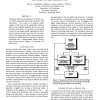35 search results - page 1 / 7 » Could the use of a knowledge-based system lead to implicit l... |
DSS
2007
13 years 4 months ago
2007
The primary objective of a knowledge-based system (KBS) is to use stored knowledge to provide support for decision-making activities. Empirical studies identify improvements in de...
IJCAI
1989
13 years 6 months ago
1989
This paper describes an approach to robotic control that is patterned after models of human skill acquisition. The intent is to develop robots capable of learning how to accomplis...
ICCS
2009
Springer
13 years 11 months ago
2009
Springer
Abstract. In knowledge bases, the open world assumption and the ability to express variables may lead to an answer redundancy problem. This problem occurs when the returned answers...
ICDE
2006
IEEE
14 years 6 months ago
2006
IEEE
Speed to market is critical to companies that are driven by sales in a competitive market. The earlier a potential customer can be approached in the decision making process of a p...
CDC
2010
IEEE
12 years 11 months ago
2010
IEEE
Online Social networks are increasingly being seen as a means of obtaining awareness of user preferences. Such awareness could be used to target goods and services at them. We cons...


